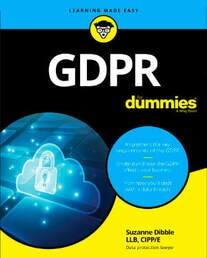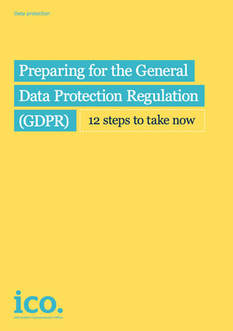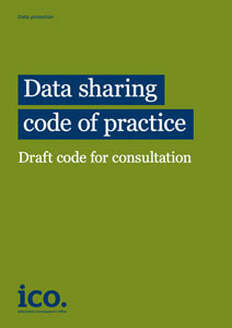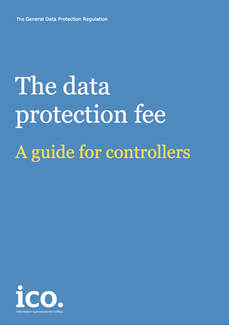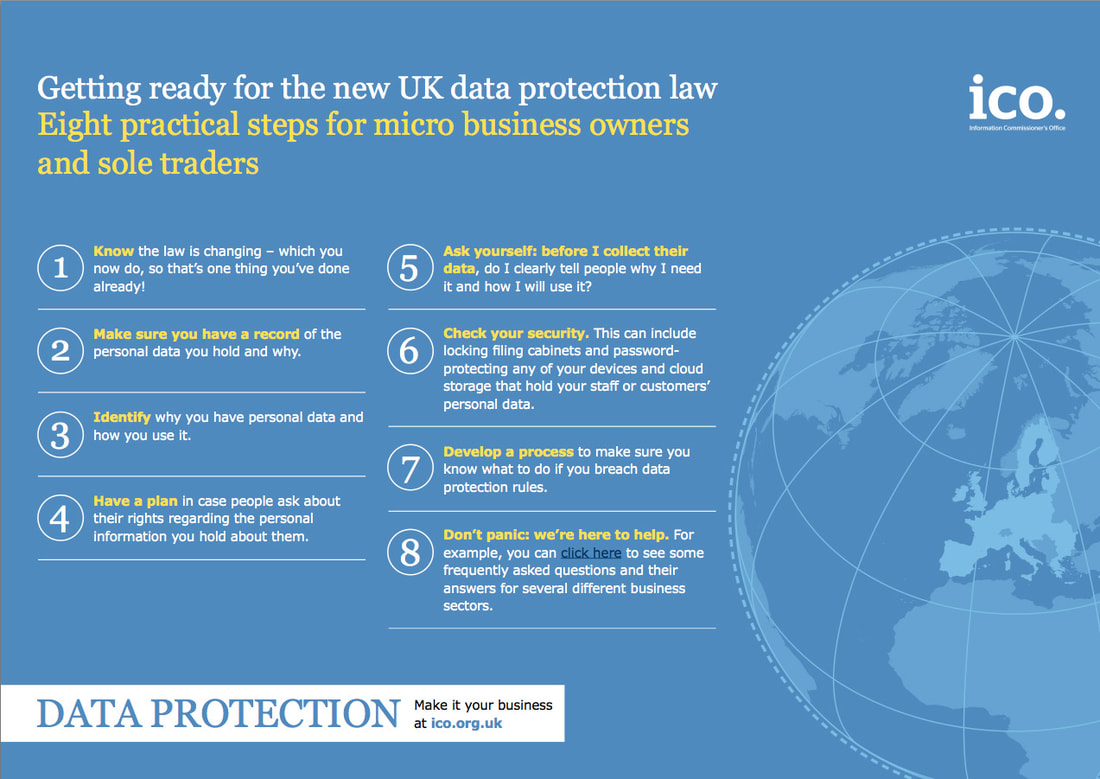- Home
- NEWS
-
PRACTICE
-
MARKETING
- How to write an Artist's Statement >
- How to write an Artist's Resume or CV >
- How to sign a painting, drawing or fine art print
- Business Cards for Artists
- How to write a press release for an artist
- The Private View Invitation
- Publicity for Juried Exhibitions
- Websites for Artists >
- Image & Video sizes for Social Media Sites
- How to be mobile-friendly
-
SELL ART
- FRAME ART
-
SHIP ART
-
COPYRIGHT
-
MONEY & TAX
- About + Help
- BANKING
General Data Protection Regulation - A Resource in Progress
The General Data Protection Regulation came into effect on 25 May 2018.
It relates to people's PERSONAL DATA - data that helps identify an individual
It affects all businesses (including sole traders) in the EU,
AND
ALL businesses outside the EU
who collect and/or process and/or store personal data relating to EU residents
Below I'm trying to put together a resource for
artists, art societies, art galleries and other organisations who need to make sure they comply.
It relates to people's PERSONAL DATA - data that helps identify an individual
It affects all businesses (including sole traders) in the EU,
AND
ALL businesses outside the EU
who collect and/or process and/or store personal data relating to EU residents
Below I'm trying to put together a resource for
artists, art societies, art galleries and other organisations who need to make sure they comply.
Any business that handles personal data, even micro-businesses with fewer than ten staff, will have to follow new data protection rules from 25 May 2018.
Index to a resource in progress
|
My aim is to provide a set of resources for artists and arts organisations to read and reference as they prepare to make sure they comply with this new and more rigorous approach to data protection for people living in the EU
|
To start with, this is going to be pretty much a list of resources - but I'll aim to extract and organise information as issues that need to be addressed become clearer.
The quotations below (in blue) highlight and focus on key facts and statements made to date. |
|
Topics covered below include:
OFFICIAL SOURCES OF INFORMATION - including enforcement action taken
|
Does this affect YOU? Try completing these two quizzes.... |
DISCLAIMER: I am NOT an expert on this topic - even if I know more than you! Nothing stated on this page is legal advice.
Like you I'm just trying to work my way through the maze of online information about GDPR. Hence this resource should NOT be construed or relied upon as legal advice. You are not my client and I do not know your individual circumstances - meaning I have no liability to you in any circumstances should you choose to rely on any of the materials on this page - although whatever is published by the ICO should be more authoritative than most.
More formally - This is a education portal and the information contained within this portal does in no way constitute legal advice. Any person who intends to rely upon or use the information contained herein in any way is solely responsible for independently verifying the information and obtaining independent expert advice if required.
Like you I'm just trying to work my way through the maze of online information about GDPR. Hence this resource should NOT be construed or relied upon as legal advice. You are not my client and I do not know your individual circumstances - meaning I have no liability to you in any circumstances should you choose to rely on any of the materials on this page - although whatever is published by the ICO should be more authoritative than most.
More formally - This is a education portal and the information contained within this portal does in no way constitute legal advice. Any person who intends to rely upon or use the information contained herein in any way is solely responsible for independently verifying the information and obtaining independent expert advice if required.
Official Sources of Information
|
The General Data Protection Regulation
|
The GDPR not only applies to organisations located within the EU but it will also apply to organisations located outside of the EU if they offer goods or services to, or monitor the behaviour of, EU data subjects. It applies to all companies processing and holding the personal data of data subjects residing in the European Union, regardless of the company’s location. |
|
What is personal data?
Personal data includes:
|
What constitutes personal data? |
Guidance from The EU on GDPR
Data protection in the EU
|
Data Protection | EU - the main portal to all relevant information - including
|
Data transfers outside the EU
- Rules on international transfers of personal data
- EU-US Privacy Shield The European Commission is committed to reviewing the arrangement on an annual basis to assess its continued level of adequacy for the protection of personal data.
- Adequacy of the protection of personal data in non-EU countries
- Binding corporate rules
- Model contracts for the transfer of personal data to third countries
EU Justice and Fundamental Rights
- National Data Protection Authorities - a listing of all the National Data Protection Authorities for each EU Country. These, in turn will have information like that produced by ICO for the UK - see below.
European Union Agency for Fundamental Rights and Council of Europe
Handbook on European data protection law by the European Union Agency for Fundamental Rights (PDF)
- The manuscript for this handbook was completed in April 2018.
- Updates will become available in future on the FRA website at fra.europa.eu, the Council of Europe website at coe.int/dataprotection, on the European Court of Human Rights website under the Case Law menu at echr.coe.int, and on the European Data Protection Supervisor website at edps.europa.eu.
GDPR for Dummies
by Suzanne Dibble
HIGHLY RATED: Has been #1 Best Seller in Business Law / In the Top 10 Business Law Books on Amazon.
An ideal reference book for any business owner anywhere in the world who needs to deal with GDPR if transacting any business with anybody in the UK
by Suzanne Dibble
HIGHLY RATED: Has been #1 Best Seller in Business Law / In the Top 10 Business Law Books on Amazon.
An ideal reference book for any business owner anywhere in the world who needs to deal with GDPR if transacting any business with anybody in the UK
Sets out in simple steps
- how small business owners can comply with the complex General Data Protection Regulations (GDPR)
- what constitutes personal data and special category data
- how to avoid fines, regulatory investigations and customer complaints
- how to gain consent for online and offline marketing
- and much more!
|
Paperback: 464 pages
Publisher: John Wiley & Sons Publication date: 23 Jan. 2020 Rated an average out of 5 stars UK: 4.8 by 67 customer reviews USA: 4.7 by 32 customer reviews BUY THIS BOOK GDPR For Dummies
GDPR For Dummies
|
UK - Guidance from The Information Commissioner
|
The Information Commissioner's website has extensive information about GDPR which is being expanded on a regular basis. Very much worth keeping an eye on.
|
Good information handling makes good business sense. You'll enhance your business's reputation, increase customer and employee confidence, and by making sure personal information is accurate, relevant and safe, save both time and money. |
The GDPR applies to processing carried out by organisations operating within the EU. It also applies to organisations outside the EU that offer goods or services to individuals in the EU. |
|
In the recent past the eight principles for processing personal information are that anyone who processes personal information must comply with eight principles, which make sure that personal information is:
|
The GDPR provides the following rights for individuals:
|
Personal data breaches can include: |
Extracts from recent blog posts
People have a right to have their personal data kept safe, only used in ways that are properly explained to them, and for certain uses of their data, to which they expressly consent. Hackers should not be getting to core systems in the first place. Privacy by design should be in every part of your information processing, from the hardware and software to the procedures, guidelines, standards, and polices that your organisation has or should have. |
ICO: General Guidance on GDPRGeneral Guidance
|
You don’t need to pay a fee if you are processing personal data only for one (or more) of the following purposes:
- Staff administration
- Advertising, marketing and public relations
- Accounts and records
- Not-for-profit purposes
- Personal, family or household affairs
- Maintaining a public register
- Judicial functions
- Processing personal information without an automated system such as a computer
The Data Protection Fee
ICO: GDPR Guidance for different organisations
- Small organisations - General Data Protection Regulation (GDPR) FAQs for small organisations
- Micro-business Owners - a dedicated page on the website - Making data your business PLUS a practical guide (pdf file) to download Eight practical steps for micro business owners and sole traders
- Charities: General Data Protection Regulation (GDPR) FAQs for charities There is also a dedicated advice line for small organisations
ICO: Blog posts about GDPR
This is the ICO News Blog - https://iconewsblog.org.uk/
Key blog posts include:
Key blog posts include:
ICO: Enforcement Action
- Enforcement action lists the variety of actions taken by ICO in relation to inappropriate use of personal data by various organisations - including charities and individuals - in relation to non-compliance with the laws that protect privacy and prevent nuisance phone calls.
ADVERT
Ireland - Guidance from Irish Data Protection Commissioner
The Data Protection Commission (DPC) is the national independent authority responsible for upholding the fundamental right of individuals in the EU to have their personal data protected. The DPC is the Irish supervisory authority for the General Data Protection Regulation (GDPR), and also has functions and powers related to other important regulatory frameworks including the Irish ePrivacy Regulations (2011) and the EU Directive known as the Law Enforcement Directive.
GDPR for Dummies by Suzanne Dibble
|
A book about data protection law for anybody doing business in Europe - no matter where you are located.
|
Suzanne Dibble is a very switched on lawyer who specialises in small business issues. She created and led the Facebook Group about GDPR for online entrepreneurs which provided most of the answers while it was being introduced. I was on it every day while everybody had their heads down trying to understand the implications.
I've not read this book (it's not yet published) - but I do know that the author has very many fans for her explanations of what you need to know. I have been one of them! |
Paperback: 464 pages
Publisher: John Wiley & Sons DUE DATE: 19 Feb. 2020 ORDER THIS BOOK GDPR For Dummies (For Dummies (Computer/Tech))
GDPR For Dummies (For Dummies (Computer/Tech))
|
Issues for Artists and Art Organisations
What is the General Data Protection Regulation?
What does it mean for your business as an artist?
What does it mean for your business as an artist?
This section is by no means definitive
What I've tried to do is find relevant articles by people who have looked at GDPR in terms of
What I've tried to do is find relevant articles by people who have looked at GDPR in terms of
- its impact on the arts sector
- in relation to artists (as sole traders), art societies, art galleries and other art organisations.
Issues for artists and arts organisations
|
These include:
Note: There is absolutely no information on the Arts Council website. You can try looking - but for me it gave every appearance of being completely unaware that GDPR is happening and that it has implications for the art sector!
|
Data consent |
Issues for Art Teachers
Data protection law regulates how colleges, universities and other learning providers collect and use information about students, staff and others. It also provides individuals with the right to access information that is held about them.
|
If you are employed as an art teacher: your employer will
If you are an independent provider of art tuition - as either a company or sole trader - you have to implement all the protocols and practices yourself. This is particularly important in relation to anybody who has recently moved their teaching online |
REFERENCE:
|
Marketing and fundraising for arts organisations / charities / museums
|
Use of personal data for marketing or not for profit purposes provides an exemption from having to pay the Data Protection Fee.
However volunteers are no different to employees in the eyes of GDPR.
|
....charities can send direct marketing by post or make calls to numbers not registered with the telephone preference service, provided they can satisfy the legitimate interest condition. |
Implications for Sole Traders
|
Things an artist / sole trader / freelancer MUST do includes:
|
You MUST include a privacy notice when collecting personal data / on your website / online store
Download the PRIVACY NOTICE TEMPLATE produced by ICO (Word file) REFERENCE
|
Do people know you have their personal data and understand how you use it?
ICO Self assessment questions quiz
If so, does this privacy notice or statement include all the below information:
ICO Self assessment questions quiz
- Do you tell people how you use their personal data?
- Do you tell people if you’re sharing their data?
- Do you tell people what you plan to do with their data either in paper form, such as using leaflets or posters, or online through a privacy notice or statement?
If so, does this privacy notice or statement include all the below information:
- The name of your business and the person responsible for data protection.
- Why you hold the personal data (your lawful basis) and what you do with it.
- Where you got the data from.
- Who you share the data with and how you do this, including any sharing outside the UK.
- How long you keep the data for.
- How people can request access to, or correction or deletion of, their data.
- How to complain to the ICO.
- Whether you make automated decisions or do profiling based on the data you hold.
Art Galleries and Art Dealers
- A secretive art world grapples with data protection legislation | Financial Times
Data Breaches
It is a criminal offence for anyone to knowingly or recklessly obtain (or disclose) information about someone from a data controller without its consent.
Some examples of what art organisations (art societies and art galleries do) - without thinking first!
- An email sent to me about an event by an organisation acting on behalf of an art society disclosed its complete mailing list and all the e-mail addresses on it to everybody on that mailing list.
- Another art society recently sent me its handbook. It contained every member's name, address, telephone number and e-mail address. Apart from the fact that I don't need all of this information, it represents a fraudster's dream come true.
- An art society had a laptop stolen recently. It contained all the personal contact details of all its members. The data was not encrypted.
- A fourth (and fifth and sixth and seventh....) art society lists the home addresses and telephone numbers of all its members in the brochure for its annual exhibition - distributed without making a note of who gets it.
Advice from Bloggers
|
When looking at most normal blogs, personal data will include: |
Articles / Advice from Art People
|
Four questions for you - and your art society and/or art gallery: |
ADVERT
GDPR and Specific Personal Data Processors
All agencies which you transact with and which processes personal data of EU residents MUST be compliant with GDPR - or else you should NOT use them.
Artists and art organisations rely on third parties to help them with specific functions eg receiving/making payments; sending emails and newsletters, marketing and promoting their art. All of these third parties must also comply with ALL the GDPR requirements relevant to them. If their business is data processing then they may have additional requirements.
Artists and art organisations rely on third parties to help them with specific functions eg receiving/making payments; sending emails and newsletters, marketing and promoting their art. All of these third parties must also comply with ALL the GDPR requirements relevant to them. If their business is data processing then they may have additional requirements.
Cookies generally
(30):“Natural persons may be associated with online identifiers provided by their devices, applications, tools and protocols, such as internet protocol addresses, cookie identifiers or other identifiers such as radio frequency identification tags. This may leave traces which, in particular when combined with unique identifiers and other information received by the servers, may be used to create profiles of the natural persons and identify them” |
What do we need to do to comply? |
|
Cookies which identify individuals are considered to be personal data.
The majority of cookies are used to identify users. These include cookies for analytics, advertising and functional services, such as survey and chat tools. They therefore count as personal data within GDPR - which is why so many people started analysing cookies and then designing precise controls for them. Not that every website has made that clear... These sites are helpful in explaining cookies and are included by a number of websites as a way of providing extra information for consumers |
APPLE
This is
- Apple's Privacy section on its website
- the new Apple Privacy Policy
|
Google has a website related to Businesses and Data Protection and Privacy which makes various commitments
Google states that it is committed to complying with applicable data protection laws
Learn more about Google's commitment to GDPR here. This covers:
|
GOOGLE'S STATEMENT RE.
Our commitment to GDPR We are working hard to prepare for the EU’s General Data Protection Regulation (GDPR). Keeping users’ information safe and secure is among our highest priorities at Google. Over the years, we have spent a lot of time working closely with Data Protection Authorities in Europe, and we have already implemented strong privacy protections that reflect their guidance. We are committed to complying with the new legislation and will collaborate with partners throughout this process.
|
Google is committed to complying with the EU General Data Protection Regulation (GDPR) for G Suite and Google Cloud Platform services.
Google AdSenseChanges to our ad policies to comply with the GDPR March 22, 2018 - we will be updating our EU consent policy when the GDPR takes effect and the revised policy will require that publishers take extra steps in obtaining consent from their users
|
Google Cloud
|
Google Blogger
This is the statement which appeared on Google's Blogger blogs on 25th May 2018.
This is the link in the notice to Google's statement on Cookies notification in European Union countries
This is the link in the notice to Google's statement on Cookies notification in European Union countries
Google and cookiesGoogle references this site with respect to cookies and Helping publishers and advertisers with consent
http://www.cookiechoices.org/ |
Google EU Consent PolicyThis page is all about the Google EU Consent Policy
|
ONLINE PAYMENTS - PayPal
|
ONLINE PAYMENTS - Square Inc.
|
CONTACTS - Mailchimp
|
CONTACTS - AWeberAWeber does NOT currently recognise the General Data Protection Regulation. When using the term (and GDPR) in its search facility there were no results. My conclusion is AWeber is not GDPR compliant.
|
CONTACTS - Feedblitz |
CONTACTS - (Google) Feedburner
|
DATA - Dropbox
|
DATA - WeTransfer
|
3rd Party Sales - EtsyArtists who sell their art via Etsy will be REQUIRED to create and comply with their own GDPR-compliant privacy policy.
|
WEBSITES - Squarespace
|
Websites - Weebly
WEBSITES - Wix
|
Data Protection: A Practical Guide to UK and EU law by Peter Carey
|
An authoritative handbook about the law on data protection in the UK and EU
- but not cheap! |
The guide is a very welcome publication and brings together commentary on data protection legislation from a variety of sources. There are a number of contributors to the guide, all of whom are highly regarded and active in their field and this is apparent through their practical and insightful application of data protection law throughout the guide. The foreword from the information commissioner, Elizabeth Denham, adds further weight to the guide which, as the synopsis suggests, is an invaluable handbook for all data protection practitioners. (David White, New Law Journal) |
Paperback: 410 pages
Publisher: Oxford University Press Edition: 5th Publication date: 1 May 2018 Data Protection: A Practical Guide to UK and EU law
Data Protection: A Practical Guide to UK and EU Law
|
GDPR Advice - Other Sources
GDPR Facebook Groups
|
The following are Facebook Groups that have been set up to review and address issues associated with GDPR. Bear in mind that the bulk of discussions will of no relevance to art organisations or artists - but many of the issues that other organisations and sole traders face are broadly similar.
|
|
Advice from Lawyers
|
When reviewing advice from lawyers look at what their expertise is to be providing advice about GDPR.
Be mindful of WHEN the advice was produced and whether it has been superseded by any official information which either clarifies or updates official guidance on topics or interpretation. |
|
GDPR for online entrepreneurs - busting the myths, the sensible approach
The video below provides a two hour training session - one for those who need to focus on what GDPR means
There is a lot of hype around GDPR and the headline busting €20m fines for business owners that don't comply. Multi-award winning business lawyer and data protection expert Suzanne Dibble busts the myths on GDPR, sets out clearly what you really need to know and shows you the simple steps you need to take for compliance.
GDPR FAQs
- General Data Protection Regulation | Wikipedia
- GDPR Summary of Key Changes - An overview of the main changes under GPDR and how they differ from the previous directive
- GDPR FAQS: Frequently Asked Questions about the incoming GDPR. This is a good place to start
- What is GDPR? | Thorntons (lawyers)
Articles / Advice / Blogging about GDPR from Generic Sources
Blog posts can be very useful sources of alternative perspectives and information tailored to specific circumstances rather than reiterations of the official guidance.
Business Bloggers
|
NewspapersWhat is GDPR and how does it affect you? | The Guardian - and article written for the week in which GDPR comes into force
|
ABOUT ART BUSINESS INFO. FOR ARTISTS
This website aims to provide a compendium of resources about the art business for artists. Please read "PLEASE NOTE"
It helps artists learn how to do better at being business-like, marketing and selling their art and looking after their financial security.
This website aims to provide a compendium of resources about the art business for artists. Please read "PLEASE NOTE"
It helps artists learn how to do better at being business-like, marketing and selling their art and looking after their financial security.
|
Copyright: 2015-2021 Katherine Tyrrell | Making A Mark Publications
- all rights reserved If you've got any suggestions for what you'd like to see on this website please send me your suggestion
|
PLEASE NOTE:
1) Content and the law change all the time. It's impossible to keep up with it if you're not working on the topic full time. 2) I research topics carefully. However, I am totally unable to warrant that ANY and/or ALL information is
|
3) Hence all information I provide comes without any LIABILITY whatsoever to you for any choices you make.
4) This website is FREE FOR YOU but not for me. Links to books are Amazon Affiliate links. Buying a book via this website means I get a very small payment which helps to fund and maintain this website. .I much appreciate any support your provide. Adverts are provided by Google AdSense - but the adverts do not mean I endorse the advertiser. |
- Home
- NEWS
-
PRACTICE
-
MARKETING
- How to write an Artist's Statement >
- How to write an Artist's Resume or CV >
- How to sign a painting, drawing or fine art print
- Business Cards for Artists
- How to write a press release for an artist
- The Private View Invitation
- Publicity for Juried Exhibitions
- Websites for Artists >
- Image & Video sizes for Social Media Sites
- How to be mobile-friendly
-
SELL ART
- FRAME ART
-
SHIP ART
-
COPYRIGHT
-
MONEY & TAX
- About + Help
- BANKING

